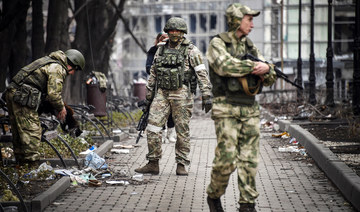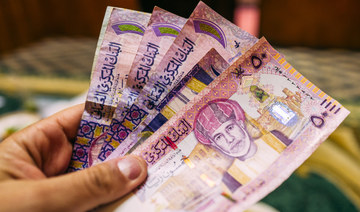TEHRAN: Iran appears set to be ousted from a UN women’s body on Wednesday for policies contrary to the rights of women and girls, but several countries are expected to abstain from the vote requested by the United States, diplomats said.
The 54-member UN Economic and Social Council (ECOSOC) will vote on a US-drafted resolution to “remove with immediate effect the Islamic Republic of Iran from the Commission on the Status of Women for the remainder of its 2022-2026 term.”
The 45-member Commission on the Status of Women meets annually every March and aims to promote gender equality and the empowerment of women. A US official told Reuters they had “consistently seen growing support” to remove Iran.
Iran, 17 other states and the Palestinians argued in a letter to ECOSOC on Monday that a vote “will undoubtedly create an unwelcome precedent that will ultimately prevent other Member States with different cultures, customs and traditions ... from contributing to the activities of such Commissions.”
The letter urged members to vote against the US move to avoid a “new trend for expelling sovereign and rightfully-elected States from any given body of the international system, if ever perceived as inconvenient and a circumstantial majority could be secured for imposing such maneuvers.”
Only five of the signatories to the letter are currently ECOSOC members and able to vote on Wednesday.
The Islamic Republic on Monday hanged a man in public who state media said had been convicted of killing two members of the security forces, the second execution in less than a week of people involved in protests against Iran’s ruling theocracy.
Nationwide unrest erupted three months ago after the death while in detention of 22-year-old Kurdish Iranian woman Mahsa Amini, who was arrested by morality police enforcing the Islamic Republic’s mandatory dress code laws.
The demonstrations have turned into a popular revolt by furious Iranians from all layers of society, posing one of the most significant legitimacy challenges to the Shiite clerical elite since the 1979 Islamic Revolution.
Iran has blamed its foreign enemies and their agents for the unrest.
The Geneva-based UN Rights Council voted last month to appoint an independent investigation into Iran’s deadly repression of protests, passing the motion to cheers of activists. Tehran accused Western states of using the council to target Iran in an “appalling and disgraceful” move.
Iran likely to be ousted from UN women’s body
https://arab.news/rfuwb
Iran likely to be ousted from UN women’s body

- The 45-member Commission on the Status of Women meets annually with aims to promote women empowerment
Indian Hajj pilgrims take train from Jeddah to Makkah
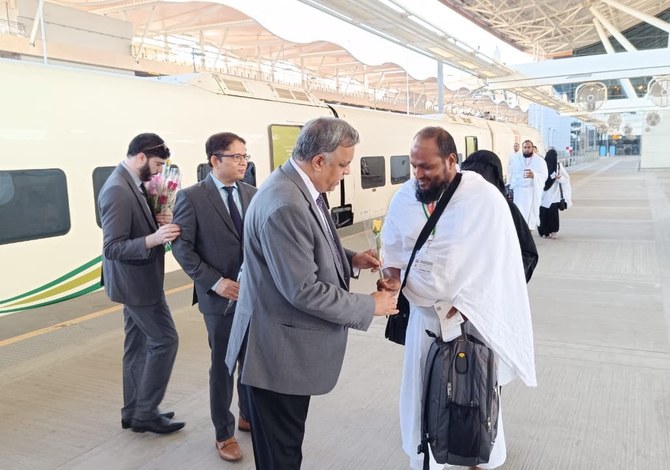
JEDDAH: Traditionally, all pilgrims arriving at Jeddah International Airport travel to Makkah by buses provided by Saudi authorities. This year, however, special arrangements have been made by the Consulate General of India in Jeddah, in tandem with the Saudi authorities, for some Indian pilgrims to travel via the Haramain High Speed Railway from Jeddah airport to Makkah.
About 32,000 Indian pilgrims will benefit from this exclusive service, reducing travel time by half thanks to the train’s maximum speed of 300 kph.
To commemorate the historic occasion, India’s ambassador, Dr. Suhel Ajaz Khan, and Consul General Mohd Shahid Alam accompanied Indian pilgrims on the inaugural journey from Jeddah airport to Makkah on Sunday.
The pilgrims arrived in the Kingdom on a Saudia flight from Mumbai.
They were joined by Khaled Al-Harbi, senior vice president of operations at Saudi Arabia Railways, as well as officials from the ministries of Hajj and Umrah, and transport.
This is the first time Saudi Arabia is transporting a limited number of Hajj pilgrims directly from Jeddah airport to Makkah by train.
This year, 175,000 pilgrims from India will participate, with 140,000 organized through the Hajj Committee of India.
SME financing in Saudi Arabia surges 20.4% in Q4
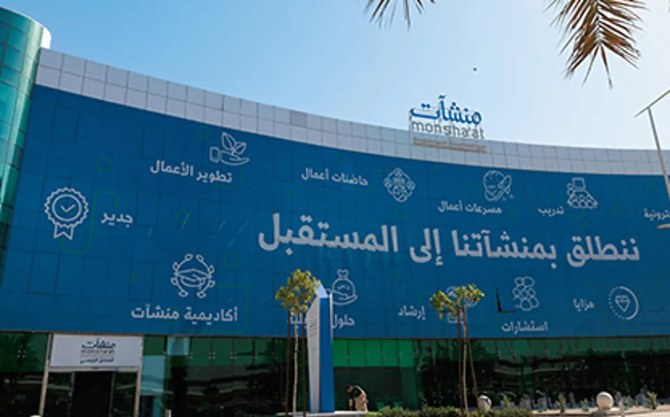
RIYADH: Financing provided to small and medium enterprises in Saudi Arabia surged by 20.4 percent year on year to $73.5 billion in the fourth quarter of 2023, official data showed.
In its latest quarterly report, the Kingdom’s Small and Medium Enterprises General Authority said that credit facilities provided to micro and SMEs amounted to $6.7 billion and $24.6 billion, respectively, in the last three months of 2023.
On the other hand, medium enterprises in the Kingdom secured finance worth $42.2 billion in the last quarter of the previous year.
The authority, also known as Monsha’at revealed that banks in Saudi Arabia provided credit facilities worth $68.9 billion in the fourth quarter of 2023, representing a rise of 21.1 percent compared to the same period of the previous year.
On the other hand, finance companies in the Kingdom provided loans amounting to $4.6 billion in the last three months of 2023, marking a year-on-year rise of 9.3 percent.
Developing the SME sector is crucial for Saudi Arabia as the Kingdom is currently on a path of economic diversification, as it steadily reduces its dependency on oil.
The report revealed that 9,644 SMEs were benefitted from Monsha’at support centers in the first quarter of this year.
Moreover, three SMEs had their initial public offering on the parallel market Nomu through the Tomoh program in the first quarter of 2024.
Monsha’at also revealed that Saudi Arabia led venture capital funding in the Middle East and North Africa region with $240 million deployed across 35 deals in the first quarter of this year.
“With $240 million deployed across 35 deals to Saudi-based companies, the Kingdom accounted for a remarkable 65 percent of all VC funding in the region,” said the authority.
The report attributed 54 percent of this VC funding to the $130 million pre-initial public offering secured by Salla in March.
“While the $240 million invested in the first quarter maintains the Kingdom’s dominance, it did reflect a considerable quarterly drop of 70 percent from the fourth quarter of 2023, along with a 42 percent year-on-year drop. This downturn mirrors the broader trend across the MENA landscape,” said Philip Bahoshy, founder and CEO of venture capital data platform MAGNiTT.
He added: “Digging deeper, it becomes evident that while the overall funding has diminished, the Kingdom’s entrepreneurial ecosystem continues to attract investors.”
Greek authorities release Pakistani woman athlete after two-day detention, ask her to return home
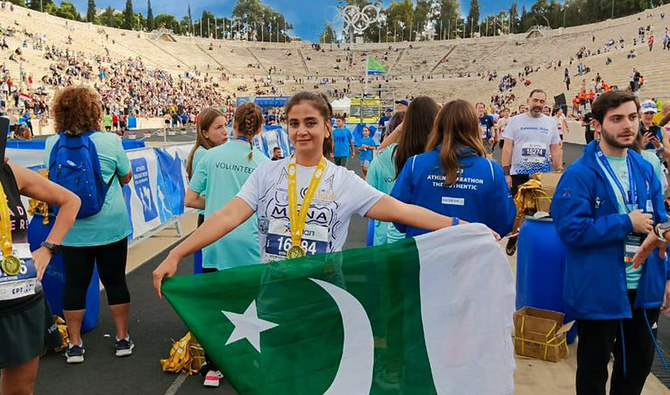
- Mona Khan, who also works with Pakistan state TV, was arrested on Friday while going to Greece’s Mount Olympus with a team of climbers
- The Pakistani athlete says she was arrested ‘due to her Pakistani identity and was questioned about carrying Kalima Tayyaba with her’
KARACHI: Pakistani woman athlete and journalist Mona Khan, who was arrested in Greece this week, has been released from prison, she said on Sunday, a day after the Pakistani Foreign Office said its mission was actively engaged with Greek authorities on the case.
Khan said she was stopped at a checkpoint on Friday afternoon when she was going to Mount Olympus along with a team of climbers, and upon checking her passport, Greek authorities held her for investigation, from where they took her to jail.
The athlete, who also works with Pakistan’s state TV as a host and participated in the Athens marathon last year, said she wanted to wave the Pakistan flag and Kalima Tayyaba on the highest mountain peak in Greece, that lies some 433 kilometers from Athens.
On Saturday, Mumtaz Zahra Baloch, a spokesperson for Pakistan’s Foreign Office, told Arab News the Pakistani mission in Athens was actively engaged with Greek officials to secure the release of the Pakistani athlete.
Speaking to Arab News after her release on Sunday, the Pakistani athlete said her release was “conditional” even though she had violated no rules of the host country, while she would also not be able to return to Greece for five years.
“They arrested me just when they saw my Pakistani passport and later questioned me when they found Kalima Tayyaba in my bag,” Khan said.
“I am completely clueless as to why they arrested me, deprived me of a chance to accomplish my goal, and then asked me to leave.”
She said she was asked to sign documents that she would not enter another European country despite having visas and would return to Pakistan within 20 days.
“It’s my right to know what laws I have violated,” Khan said. “I was there for a healthy activity, but what happened to me caused me mental stress.”
Greek authorities have not issued any statement on Khan’s detention, while the Pakistani Foreign Office spokesperson did not respond, when asked about reasons for her detention and whether Pakistan had protested with Greek authorities in case Khan had not violated any laws of the host country.
“Jailed for doing nothing and just because of being Pakistani,” Khan said, after reuniting with her son, who was waiting for her to return after completing the mission to wave the Pakistani flag and Kalima Tayyaba on Mount Olympus.
“He asked for the video where I was supposed to wave the flag. I didn’t end his excitement and didn’t tell him about my ordeal.”
Oman’s banking sector sees 2.9% rise in credit to $80bn by end of March
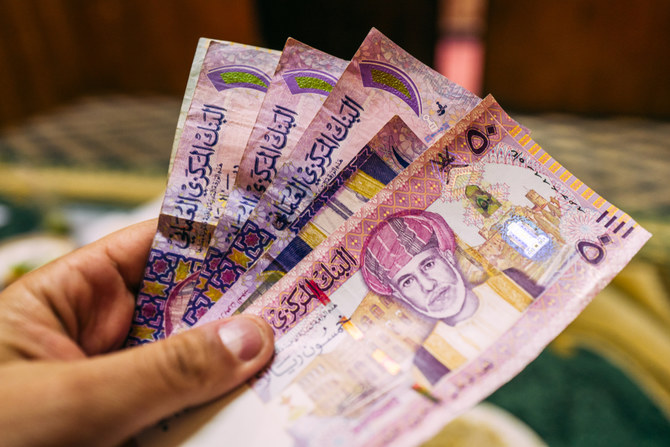
RIYADH: Oman’s banking sector experienced a 2.9 percent rise in total credit, reaching 30.8 billion Omani rials ($80 billion) by the end of March, official data showed.
In its monthly review of banking and monetary developments, the Central Bank of Oman disclosed that credit to the private sector rose by 3.6 percent year-on-year, reaching 25.9 billion rials by the end of March.
Non-financial corporations held the largest share of the total private sector credit, accounting for approximately 45.4 percent by the end of March, followed closely by households at 45 percent.
Financial corporations constituted 5.8 percent of the total, while the remaining 3.8 percent was allocated to other sectors.
Total deposits held with other depository corporations witnessed a significant year-on-year growth of 11.7 percent, reaching 30.3 billion rials at the end of March, while total private sector deposits grew by 13.7 percent to 20.2 billion rials.
The increase in private sector credit and deposits reflects robust economic activity and confidence in the financial system.
Regarding the sector-wise composition of private sector deposits, household holdings contributed the most at 49.8 percent, followed by non-financial corporations at 30.9 percent, financial corporations at 16.5 percent, and other sectors at 2.8 percent.
The combined balance sheet of conventional banks showed a year-on-year growth of 0.8 percent in total outstanding credit as of the end of March.
Credit to the private sector increased by 1.6 percent, reaching 20.3 billion rials, while overall investments in securities surged by 28.0 percent to 5.7 billion rials.
Investment in government development bonds decreased by 17.1 percent to 1.8 billion rials, while investments in foreign securities saw a dramatic increase of 139.0 percent to 2.3 billion rials.
Moreover, aggregate deposits in conventional banks experienced significant growth, while government deposits declined. Public enterprise holdings increased substantially, and private sector deposits rose.
Simultaneously, Islamic banks and windows witnessed notable growth in total assets, financing, and deposits, underscoring their expanding role within the banking system.
The report further highlighted that the nation’s nominal gross domestic product declined by 2.8 percent at the end of the fourth quarter of 2023, primarily due to a significant drop in the hydrocarbon sector despite growth in the non-hydrocarbon sector.
However, real GDP increased by 1.3 percent during the same period. Both the average oil price and daily production saw decreases, while inflation remained minimal.
Saudi fashion industry projected to expand by 48% by 2025
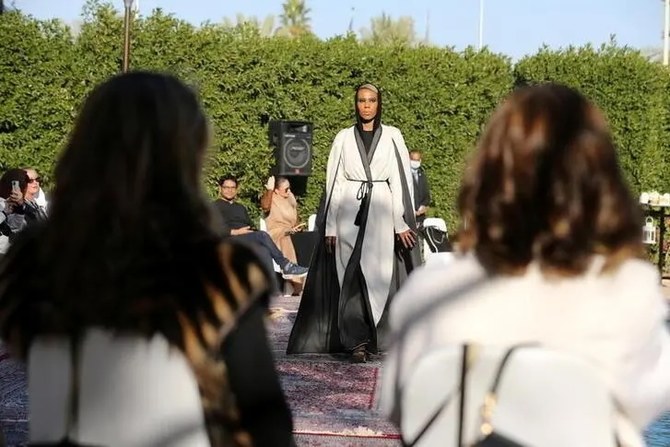
RIYADH: Saudi Arabia’s fashion industry is set to post a cumulative annual growth of 48 percent from 2021 to 2025 as the Kingdom diversifies its economy, a report said.
In its latest quarterly release, the Small and Medium Enterprises General Authority said that Saudi Arabia’s Fashion Commission is playing a crucial role in building a more robust ecosystem to propel the sector’s growth.
The authority, also known as Monsha’at, revealed that the fashion industry contributed 1.4 percent of the Kingdom’s gross domestic product in 2022.
The report added that the total value of the fashion sector in Saudi Arabia, including international brands, stood at $24.6 billion in 2022.
On the other hand, the domestic fashion industry in the Kingdom was worth $12.5 billion in 2022.
“Saudi Arabia has embarked on a profound transformation across multiple industries. This renaissance spans architecture, music, film, art, food, and more. Through diverse initiatives at the Fashion Commission, we are revolutionizing the fashion sector and elevating our talents to global stages while adhering to the core pillars that drive growth and sustainability,” said Burak Cakmak, CEO of the Fashion Commission.
He added: “Due to several strategic initiatives that fostered a dynamic ecosystem of creativity and business acumen, the growth of the fashion industry in Saudi Arabia over the past few years has been unprecedented.”
Cakmak said that developing local talent in the Kingdom is one of the crucial missions of the Fashion Commission.
He added that the organization has initiated comprehensive educational programs, workshops, and mentorship opportunities to develop the growth of Saudi nationals in the sector.
The official also noted that the commission assists small and medium enterprises operating in the sector in growing and expanding their businesses.
“We also advance the industry by providing essential support to entrepreneurs and SMEs, offering assistance and resources that help businesses scale. Regulatory frameworks are established and enforced to ensure ethical practices and sustainability, while cultural preservation initiatives highlight Saudi heritage, promoting it both locally and globally,” said Cakmark.
The Monsha’at report added that the fashion industry in Saudi Arabia has employed over 230,000 people as of 2022, and 52 percent of the workforce is female.
The authority revealed that the women’s apparel market in the Kingdom will witness a 20 percent growth by 2027, while the men’s market is set to expand by 27 percent during the same period.
Cakmak added that participation in international fashion events by Saudi companies will help affirm the place of the Kingdom in the global arena.
“Market expansion efforts, including marketing campaigns and participation in international fashion events, further enhance the visibility and competitiveness of Saudi fashion brands. All of these are core strategic pillars that effectively nurture a vibrant, dynamic, and globally competitive fashion industry in the Kingdom,” Cakmak noted.
He concluded: “We believe that the future of Saudi fashion lies in the hands of our talented designers and visionary entrepreneurs. As we continue to support and nurture these individuals, we are confident that the Kingdom’s fashion industry will continue to flourish.”



